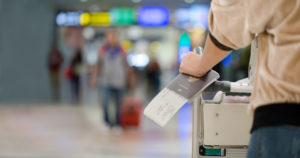Whether you have an overseas job offer or you’re daring to venture out on your own, moving abroad is a big step. It’s also an exciting one! All of the new food, immersion in a new culture, and exploring new neighborhoods… There are a ton of possibilities on the horizon.
Making sure you have a smooth arrival means preparing yourself ahead of time. There are a few things to keep in mind when relocating abroad. We’ve put together some tips for moving internationally to help make sure you’re prepared.
Useful Tips
Check Customs Fees
When moving internationally, you’ll probably pack a giant suitcase to take with you on the plane. This ensures you have all of the clothes and immediate things you’ll need. But excess baggage charges can be pricey and hauling suitcases can be a pain.
If you plan to send some things via post, there are some aspects you should brace yourself for. Checking international shipping rates is a good starting point. Depending on where you’re heading, you may want to decide whether it’s worth it to pay for shipping.
One of the luxuries we have in the States is that shipping and receiving from across the country can be relatively inexpensive. Once you start moving parcels internationally, you may incur customs charges. Check on the customs fees for what you’d like to send and understand what will be involved in shipping and receiving from your old home to your new one.
Downsize
The old saying “less is more” can be adapted here. Less is less in this case – less expensive and less cumbersome, that is. Time spent downsizing is invaluable.
Go through your things and get rid of what you don’t need. Are you moving to a warmer country? You probably don’t need your whole winter wardrobe. Heading somewhere with a different electrical system? It’s best to buy your important appliances there to ensure the wattage is safe. Have a collection of VHS tapes and National Geographic Magazines you forgot about in the crawlspace? It’s likely you don’t need those where you’re headed.
Pare down to the essentials. That doesn’t mean getting rid of everything that isn’t purely functional. Be discerning, though, as you go through your things and decide whether you actually need or will use them.
Make piles for selling, donating, and gifting away. You could even negotiate some indefinite loans for certain items if your friends want or need them. If or when you return, you could collect them back – like your television or sofa, for example.
Consider Storage
If there are things you won’t immediately need but can’t bear to part with forever, consider a storage unit. Storage is also a great option if you’re testing the waters overseas. Packing everything and hauling it over will become a bit of a headache if you choose to return in six months.
A climate-controlled storage unit will give you peace of mind. No matter how many seasons pass, your items will come out the same way they went in, protected from the heat and cold.
Get Your Paperwork in Order
There are some practical and legal items that you may not have considered if you were born and raised in your current country. Here are a few pieces of paperwork you should make sure you have in order:
- At least six months validity on your passport
- An apostilled copy of your birth certificate
- An apostilled copy of your marriage certificate (if applicable)
- An international driver’s license, or at minimum six months validity on your standard-issue driver’s license
Having your paperwork in order ahead of time will save you headaches on the other side.
Update Your Details
Make sure you cancel paper statements from local accounts and update your contact details wherever applicable. Do this well in advance so you can be sure you caught them all – it’s all too easy for an important one to fall through the cracks.
If you have a friend or family member who can receive necessary paperwork that must come, chat with them and confirm that it’s okay to direct necessary mail there. It would even benefit you to forward your mail there so you can see what is still outstanding to be canceled or resolved.
Consider Your Budget
Luckily, it’s not so hard these days to get a general idea of the cost of living in other places. Whether it’s Google searches or Facebook groups, you have a lot of resources available. Check rental or home purchase prices so you understand your monthly bills. An important factor is utilities – how does the price of electricity, particularly, stack up against where you are now? The exchange rate can also mean a ding to your savings, so get as much information as you can in advance. Make sure you take some time estimating your cost of living in your new hometown and get a clear idea of your moving budget before you get started.
Public Transport or Car Shopping?
While you’re researching, start looking at transportation options. This will depend largely on where you choose to live. Moving to the center of Berlin is a lot different from the Spanish countryside, for example.
Determine where you’d like to live and what this means for moving around. Will you be able to rely on public transport? Or do you need a car to get around? Will you be fine for walking to the necessities, but want to venture further out?
If you don’t need a car very often, there’s a chance a car share or rental service will suffice. If not, head back to the budget step and factor in the purchase of a car.
Hire the Experts
When it comes to sending all of your things, using shipping and mailing services just isn’t practical. It can be costly, and unreliable, and you’ll end up with a whole lot of tracking numbers to follow. Oh, and then there’s that customs angle to worry about.
Hiring professional movers is the best way to save yourself some headaches, time, and money. A moving company with experience in moving internationally will be able to give you advice, support you in the shift, and if you pick a full-service mover, they’ll even pack all of your things for the safest transport.
When you’re ready to take the big leap to live overseas, FlatRate can help. Our expert movers will help prepare your items and get them to your new home – and country – safely, so you can spend more time practicing a new language.



